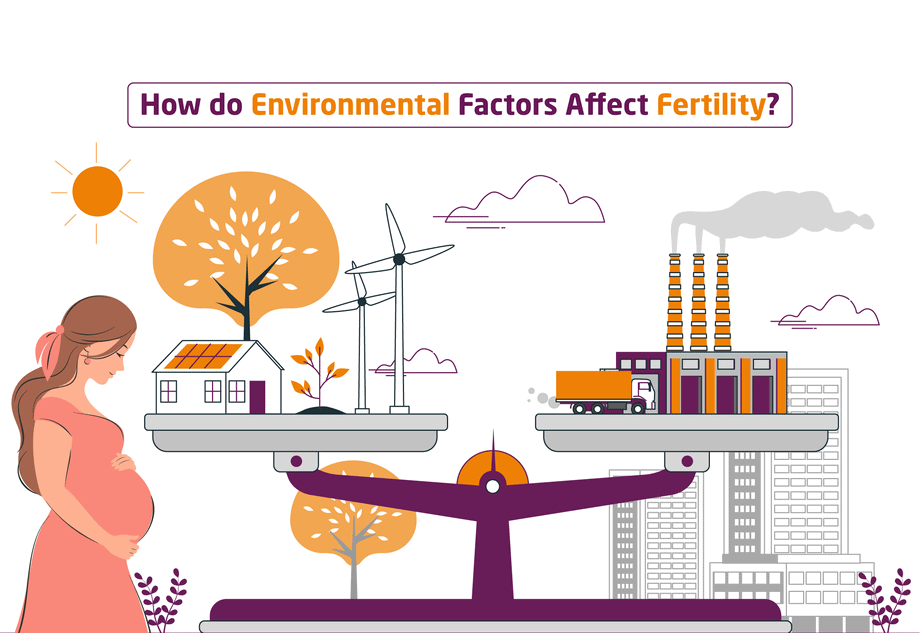Environmental Factors And Infertility: Impact On Reproductive Health

Infertility has become a significant health concern worldwide, affecting millions of couples. While various factors contribute to infertility, including genetics and lifestyle choices, emerging evidence suggests that environmental factors play a crucial role in reproductive health.
This article explores the impact of environmental factors on fertility and aims to raise awareness about their potential effects on reproductive health. Understanding the complex relationship between environmental factors and infertility is essential for individuals and healthcare professionals alike.
Numerous studies have identified environmental pollutants, such as heavy metals, pesticides, and endocrine disruptors, as potential contributors to infertility. Furthermore, lifestyle factors, including diet and exercise, have also been linked to reproductive health outcomes.
By understanding the role of environmental factors in infertility, individuals can take proactive steps to protect their reproductive health. This may involve making dietary and lifestyle changes, as well as minimizing exposure to environmental toxins. Seeking professional help from fertility specialists can provide further guidance and support for those experiencing infertility.
Advocacy and awareness are crucial in addressing the impact of environmental factors on reproductive health. By raising public awareness and promoting research into the effects of environmental factors on fertility, we can work towards implementing policies and practices that protect future generations from the detrimental effects of these factors.
In conclusion, understanding and addressing the impact of environmental factors on reproductive health is essential. By recognizing the potential risks and taking appropriate actions, individuals can protect their fertility and contribute to a healthier future for all.
Key Takeaways
- Environmental factors such as pollutants, toxins, and radiation can have a significant impact on reproductive health and contribute to infertility.
- Lifestyle factors including diet, exercise, and exposure to endocrine-disrupting chemicals can affect reproductive health outcomes.
- Anatomical abnormalities, hormonal imbalances, and genetic factors can disrupt the functioning of the reproductive system.
- Seeking professional help from reproductive medicine specialists and accessing appropriate treatments and counseling can help identify and address the underlying causes of infertility.
Understanding Infertility and its Causes
Infertility, a complex condition characterized by the inability to conceive or sustain a pregnancy, arises from a multitude of causes including anatomical abnormalities, hormonal imbalances, genetic factors, and environmental influences.
Understanding the causes of infertility is crucial for developing effective treatment strategies. Anatomical abnormalities, such as blocked fallopian tubes or uterine fibroids, can impede the fertilization process.
Hormonal imbalances, such as irregular menstrual cycles or low sperm count, can disrupt the reproductive system’s functioning. Genetic factors, such as chromosomal abnormalities or inherited conditions, can also contribute to infertility.
Furthermore, environmental influences play a significant role in reproductive health. Exposure to toxins, pollutants, and certain medications can disrupt the delicate balance of reproductive hormones and impair fertility. Additionally, factors like stress, diet, and lifestyle choices can impact reproductive health.
Considering these various factors is essential for addressing infertility and promoting reproductive well-being.
The Role of Environmental Factors in Infertility
Exposure to various external elements has been found to significantly influence the likelihood of conceiving a child.
Environmental factors play a crucial role in reproductive health and can have both direct and indirect effects on fertility.
Chemical compounds present in air, water, and food can disrupt hormonal balance and interfere with reproductive processes. For example, exposure to endocrine-disrupting chemicals, such as phthalates and bisphenol A, has been associated with reduced sperm quality and increased risk of female infertility.
Additionally, certain environmental factors, such as radiation and pollution, can cause DNA damage in reproductive cells, leading to genetic abnormalities and infertility.
It is essential to mitigate the impact of environmental factors by adopting measures to reduce exposure to harmful substances and promoting a clean and healthy environment for reproductive health.
The Link Between Diet and Fertility
Dietary choices have been shown to have a significant influence on the likelihood of conceiving a child. The link between diet and fertility has been extensively studied, and the following factors have been identified as important in this regard:
- Nutrient intake: Adequate intake of essential nutrients such as folic acid, iron, zinc, and omega-3 fatty acids is crucial for reproductive health. Deficiencies in these nutrients have been associated with increased risk of infertility.
- Body weight: Both underweight and overweight conditions can negatively impact fertility. Maintaining a healthy body weight through a balanced diet is important for optimizing reproductive function.
- Glycemic index: High glycemic index diets, which cause rapid spikes in blood sugar levels, have been linked to infertility. Choosing low glycemic index foods can help regulate blood sugar levels and improve fertility.
- Antioxidants: A diet rich in antioxidants, found in fruits, vegetables, and whole grains, can help protect reproductive cells from oxidative damage and improve fertility.
Considering the potential impact of dietary choices on fertility, adopting a healthy and balanced diet is essential for individuals seeking to enhance their reproductive health.
The Importance of Regular Exercise for Reproductive Health
Regular exercise plays a crucial role in optimizing reproductive outcomes and promoting overall wellness.
Numerous studies have shown that engaging in regular physical activity can improve reproductive health in both men and women. Exercise has been found to regulate hormone levels, enhance blood circulation to the reproductive organs, and improve ovulation and sperm quality.
It also helps in maintaining a healthy weight, which is important for fertility. Furthermore, exercise has been associated with reduced stress levels, which can have a positive impact on reproductive function.
However, it is important to note that excessive exercise can have a negative effect on fertility, as it may disrupt hormone balance and menstrual cycles. Therefore, it is recommended to engage in moderate-intensity exercise for optimal reproductive health.
Overall, regular exercise is an important component of a healthy lifestyle and can contribute to improved reproductive outcomes.
Protecting Yourself from Environmental Factors
To safeguard one’s fertility, it is imperative to be mindful of the potential hazards present in one’s surroundings. Environmental factors can significantly impact reproductive health, and taking steps to protect oneself is crucial.
Here are four important ways to minimize exposure to harmful substances:
- Avoid exposure to endocrine-disrupting chemicals (EDCs) commonly found in household products, such as phthalates in plastics and parabens in personal care items.
- Reduce exposure to air pollution by staying indoors during high pollution days, using air purifiers, and avoiding heavily trafficked areas.
- Choose organic foods whenever possible to limit exposure to pesticides.
- Limit exposure to radiation from electronic devices by using hands-free options and keeping devices away from the body.
By being aware of these potential risks and taking proactive measures to reduce exposure, individuals can better protect their reproductive health and increase their chances of conceiving.
Seeking Professional Help for Infertility
Seeking Professional Help for Infertility
Transition: After taking necessary precautions to protect oneself from environmental factors that can negatively impact reproductive health, individuals who continue to experience difficulties in conceiving may choose to seek professional help for infertility.
In this subtopic, we will discuss the importance of seeking assistance from medical experts in the field of reproductive health. Infertility can have various underlying causes, such as hormonal imbalances, structural abnormalities, or genetic factors. Consulting a healthcare professional specializing in reproductive medicine can help identify the root cause and develop an appropriate treatment plan. Common interventions for infertility include medication, surgery, assisted reproductive technologies (ART), and counseling.
To provide a visual representation of the ideas discussed, the following table presents some common causes of infertility and their corresponding treatment options:
| Causes of Infertility | Treatment Options |
|---|---|
| Hormonal imbalances | Medication |
| Structural abnormalities | Surgery |
| Genetic factors | Assisted reproductive technologies (ART) |
| Psychological factors | Counseling |
By seeking professional help, individuals can receive the necessary support and guidance to address infertility and increase their chances of achieving a successful pregnancy.
Advocacy and Awareness for Reproductive Health
Advocacy and awareness efforts play a crucial role in educating the public about the diverse aspects of reproductive health and promoting the importance of reproductive rights and access to comprehensive healthcare services. By raising awareness, advocacy groups and organizations aim to empower individuals and communities to make informed decisions regarding their reproductive health. They strive to eliminate stigma and discrimination surrounding infertility, while also advocating for policies that ensure affordable and equitable access to fertility treatments and reproductive care.
Through educational campaigns, these advocacy efforts aim to inform the public about the impact of environmental factors on fertility and reproductive health. By highlighting the environmental risks and promoting sustainable practices, they aim to evoke an emotional response in the audience, emphasizing the urgency of protecting our environment for future generations.
- The devastating consequences of environmental pollution on reproductive health.
- The heartbreaking stories of individuals struggling with infertility due to environmental factors.
- The urgent need for collective action to protect our environment and safeguard reproductive health.
Taking Action to Protect Future Generations
Taking proactive measures to safeguard the well-being of future generations necessitates a comprehensive approach that addresses the interplay between human activities and the environment.
Environmental factors have been shown to have a significant impact on reproductive health, with exposure to certain pollutants and toxins linked to infertility.
To protect future generations, it is important to raise awareness about the potential risks and advocate for policies that promote environmental sustainability.
This includes implementing regulations to reduce pollution, promoting clean energy sources, and encouraging sustainable practices in agriculture and industry.
Additionally, education and research play a crucial role in understanding the complex relationship between environmental factors and reproductive health, allowing for the development of evidence-based strategies to mitigate risks.
By taking action now, we can work towards creating a healthier environment for future generations and ensuring their reproductive well-being.
Frequently Asked Questions
What are some common myths and misconceptions about infertility that people should be aware of?
Common myths and misconceptions about infertility include the belief that it is always a woman’s problem, that age doesn’t affect fertility in men, and that stress is the main cause of infertility.
Are there any specific environmental factors that have been proven to directly cause infertility?
There are specific environmental factors that have been scientifically proven to directly cause infertility. These factors include exposure to certain chemicals, radiation, toxins, pollution, and extreme temperatures, which can negatively affect reproductive health.
Can a poor diet and lack of exercise really have a significant impact on fertility?
A poor diet and lack of exercise can significantly impact fertility. Research has shown that unhealthy eating habits and sedentary lifestyles can lead to hormonal imbalances, obesity, and other health issues that can negatively affect reproductive health.
What steps can individuals take to reduce their exposure to harmful environmental factors that may affect fertility?
Individuals can reduce their exposure to harmful environmental factors that may affect fertility by avoiding smoking, maintaining a healthy weight, limiting alcohol consumption, minimizing exposure to toxins, and using protective measures such as wearing appropriate clothing and using sunscreen.
How can individuals and communities raise awareness and advocate for better reproductive health policies and resources?
Individuals and communities can raise awareness and advocate for better reproductive health policies and resources by organizing educational campaigns, lobbying policymakers, and supporting organizations that focus on reproductive health issues.







